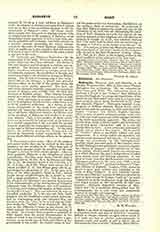

Habington, WILLIAM, poet and historian; b. at Hindlip, Worcestershire, 1605; d. 1654; son of Thomas Habington the antiquarian. He was educated at Saint-Omer and Paris. The information given by Anthony a Wood in his “Athenae” that Habington returned to England “to escape the importunity of the Jesuits to join their order” rests only on a vague statement made by the ex-Jesuit Wadsworth in his “English Spanish Pilgrim”. Habington married Lucy, daughter of William Herbert, Baron Powis, and a year or two after his marriage, in 1634, issued his well-known “Castara” (see Arber’s English Reprints, 1870), a series of poems addressed mainly to his wife. In 1635 and 1640 second and third enlarged editions of the book respectively appeared. The poems are mostly short, many of them sonnets, and interspersed are several prose “characters” such as it was the fashion then to write. A few verses are addressed to friends, one of whom is Ben Jonson. All the poetry of “Castara” shows a peculiarly refined and pure imagination. It is always skillful and melodious and contains some passages of real beauty. It is marked, though not excessively, by the “metaphysical” qualities which pervaded most of the Caroline verse. In 1640 Habington also published a romantic tragedy, the “Queen of Arragon”, of less interest for its dramatic quality, which is small, than for special passages in it which illustrate the poet’s independence of mind upon certain social and political questions. It was acted at Court, and after the Restoration was revived. Habington produced in the same year, 1640, a prose “History of Edward IV”, reprinted in Kennet’s “Complete History of England” (London, 1706), stated by Wood to have been written and published at the desire of King Charles I. In 1641 followed “Observations upon History”, a series of reflective sketches in prose of great events in Europe, “such as” (he says) “impressed me in the reading and make the imagination stand amazed at the vicissitude of time and fortune”. Professor Saintsbury remarks of Habington that “he is creditably distinguished from his contemporaries by a very strict and remarkable decency of thought and language”.
K. M. WARREN

